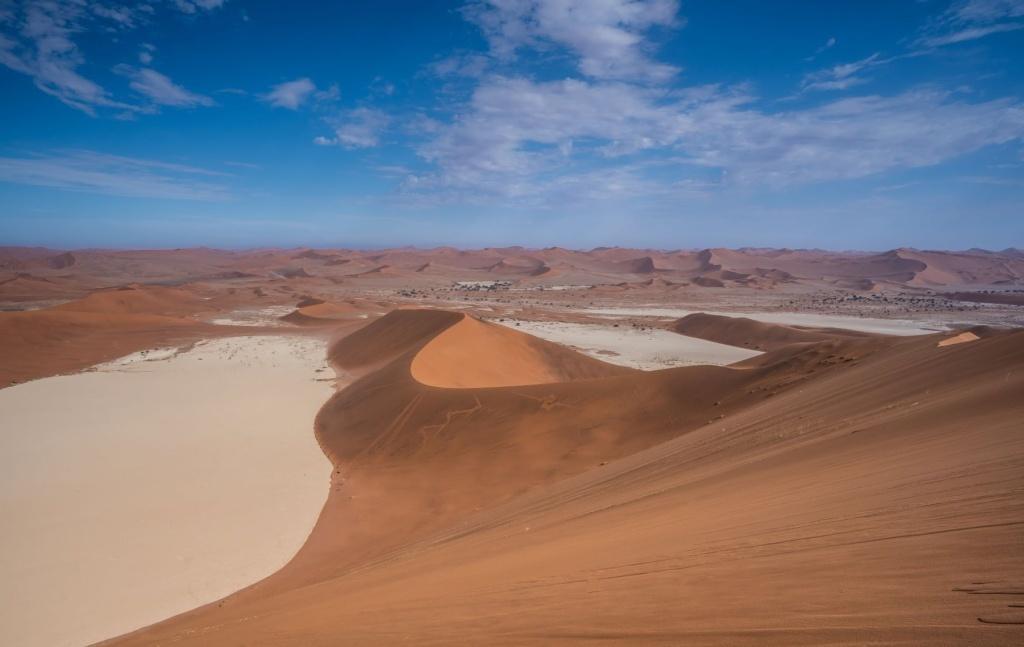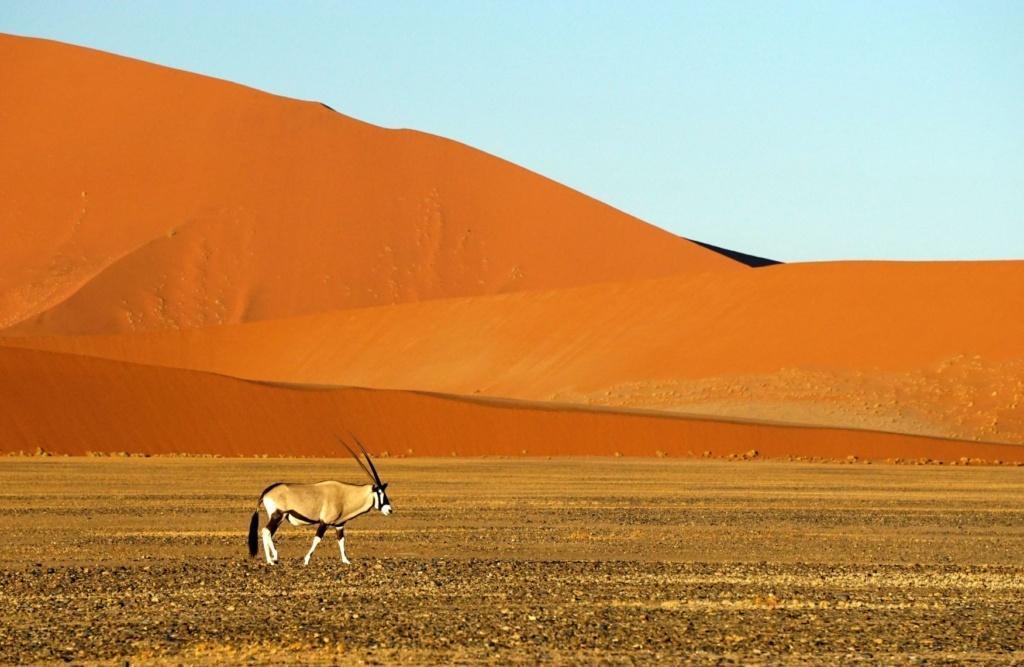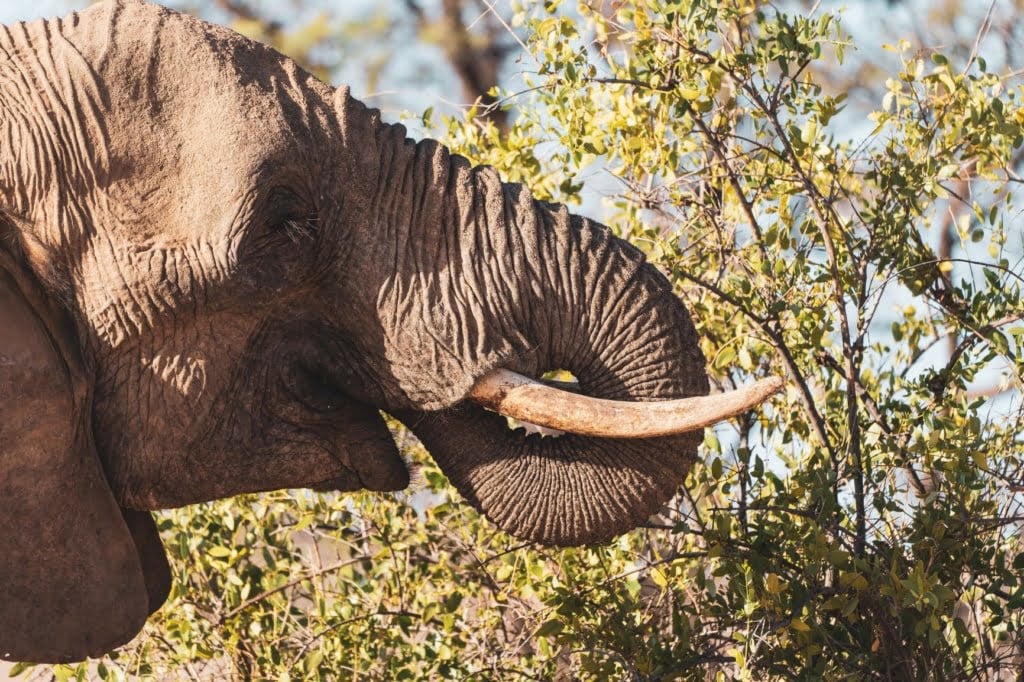Namibia is unforgettable! It’s a place you see and gasp for a minute because of the vastness of this ancient desert filled with rare stones, magnificent landscapes, coupled with all kinds of desert species. Forget Egypt or Dubai for a minute, and let us indulge you with Africa’s finest desert safari. You’ll love it!
Endowed with vast landscapes, Namibia is undeniably one of Africa’s fairest desert jewel. So if you’re into outdoor activities like hiking, wildlife and photography, this is the place to be. The Namib Desert is the earth’s oldest desert, making the country one of the tiniest populated spaces on the planet. Here, you’ll find giant dunes – the highest in the world, plenty of arid gravel plains and rugged terrain, making Namibia’s scenery dramatic and extraordinary.
Why Visit Namibia?
Namibia’s safari mostly suits independent travelers since the roads are easily navigable due to the highways’ excellent infrastructure.
Remote, secure and exclusive lodgings are available for solo travelers, couples and families.
From the stunning dunes, shifting deserts, to the rugged coastline in the west, and colorful little towns to rippling wildlife parks, Namibia should undoubtedly be on your travel list as you visit the southern part of Africa.
Driving across Namibia is mind-blowing. It’s an experience like no other. In all fairness, most of the landscapes are so unique and seem so surreal it almost feels like landing on a distant planet. Make sure you have your camera with a couple more memory sticks.
Here’s a list of cities to explore while in Namibia
Windhoek, Namibia Capital
Carved up between Mount Eros Hydra in the North, Mount Auas in the South, and Khomas Hochlans Hills, this “European-like” town is undoubtedly the ideal base to start or end your expedition across Namibia. The sleek and well-arranged city is the entry point to Namibia via the Hosea Kutako International Airport, therefore most visitors use Windhoek city as Namibia’s gateway.
Sitting more or less at the heart of Namibia, the city and the shrub-filled surroundings stretches out over a set of picturesque valleys. Undoubtedly, Windhoek is worth sacrificing a few days to explore before moving inland to the rest of the country.
You can stroll along the streets, enjoying ancient German architecture. Make sure you explore the “Christuskirche,” a Lutheran Church directly opposite Namibia’s Parliament. Don’t forget to check out the Independence Memorial Museum and learn more about apartheid.
If you still have time, head out to Daan Viljoen Game Reserve for some incredible game-driving. Later on, take a walk through the National Botanic Garden of Namibia, full of some beautiful indigenous plants and species. Don’t forget to visit Namibia Craft Center for some authentic Namibia Souvenirs.
Walvis Bay
Renowned for its natural port and a lagoon full of flamingos, Walvis Bay offers travelers a wide range of urban recreational activities that balances with its natural attractions. Walvis Bay appeals to outdoor lovers interested in water rafting, fishing, kayaking, diving, and kite-surfing.
Start with a morning run at the Walvis Bay waterfront for a picture-perfect moment as you watch the breathtaking views of the water contrasting with the blistering salty sands at the shore. Afterwards, head over to the local museum and see the ancient history on the Namib Desert at the Walvis Bay Museum. Then conclude your city tour by exploring the Walvis Bird Paradise.
If you still have some days left, head inland and try to climb the tallest dune in Walvis Bay, Dune 7, or set off the sea for a scenic cruise tour to watch the dolphins as they play. In the evening, laze around the lagoon while sampling local cuisine or treat yourself to a nice dinner at the Raft Restaurant while enjoying the sunset.
Head to Walvis Bay to see Pink Flamingos.
Swakopmund
Swakopmund is historically a perfect getaway for natives and tourists alike, with numerous outdoor activities options and fantastic old-fashioned fun. This quaint little coastal town retains a strong German touch – from cobblestone streets and scenic buildings to traditional German bars and restaurants.
A perfect way to spend the morning is strolling around the city admiring this gothic colonial architecture. Be sure to check out Woermann House and Hohenzollern Building. While there, don’t forget to check out the Swakopmund Museum, Kristall Galerie, and Living Desert Snake Park. Later on , Then head down to the National Marine Aquarium, an underwater passway for some jaw-dropping views of the marine life.
You can head down to the beach” The Mole” for some beach activities from the city. As evening approaches, you can hang out at the Swakopmund jetty, be sure to check out the various restaurants for some mouth-watering cuisines.
Cape Cross Seals
Cape Cross Seal Reserve is indescribable! Filled with hundreds upon thousands of sea seals, it’s quite a sight to behold, more like a gathering of world seals. You best watch from a distance to avoid trampling over these vast seals. You can take pictures from any angle, really, and you’ll capture dozens of them because they move in droves when they come here to breed. It’s actually the largest seal breeding colony in the world. The recommended visiting hours at Cape Cross is early in the morning from 8;00 am to avoid the seals’ stench coupled with warm winds from the sea.

The Sossusvlei Desert is incredible.
and Deadvlei
Sossusvlei desert has the world’s most giant dunes in the Namib-Naukluft National Park. Have you ever seen postcards with white salt pan-like acacia trees? These are found in Namibia, too, in Deadvlei – the white trees (dead marsh) are ancient acacia plunks that date back centuries upon centuries. To experience the dunes up close, climb up the famous Big Mama, Big Daddy, or Dune 45 as they’re fondly called – over 350 metres high. Better still, you can book a hot air balloon and marvel at the enormous conservation landscape in Africa! The best time to climb up the dunes is at sunrise to see the world from the top of the giant dunes and take incredible pictures of the spectacular sights.
Damaraland
Sitting next to the Huab River valley banks, Damaraland is flanked on the magnificent Brandberg Mountain horizon. This scenic mountainous area is famous for its large assortment of desert-adapted elephants that evoke a pervading feeling of life in this desert-like scenery. One exciting place to explore is the Twyfelfontein, a national monument that boasts hundreds of spectacular pre-historic bushmen rock paintings.
Rock climbers can head down south of Damaraland to the Spitzkoppa, an alien rock formation, for a rock-climbing challenge. If that’s not your thing, you can explore the Petrified Forest located 26 miles west of Khorixa town. Then visit the Damara Living Museum or take a hike up Etendeka Walking Trail on Brandberg Mountain. If you still have time, you can opt for a game drive, explore the rugged landscapes, meet the indigenous Damara people or lay down to enjoy the thrilling scenery.
Luderitz
This Bavarian-themed town is not what one might expect to find in Africa, but Luderitz city is full of surprises—lying between the sterile Namib Desert and the verdant south Atlantic coast. The town of Luderitz is intriguing, a true outpost with the turn of Art Nouveau architecture and numerous German street names.
A drive to the ghost town, Kolmanskop is sure worth your time. Once a wealthy mining town, this small town will mesmerize you with its well-preserved German architecture. While here, be sure to explore The Sperrgebiet” Diamond 1 Area”, a famous mining area.
Back in the city, visit the ancient Felsenkirche Lutheran Church by the hilltop. History lovers can check out the Luderitz Museum; the place has a lot to tell and show about this ancient city.
Other notable attractions include Goerke Haus, Original Dias Cross, and Robert Harbor.
Rundu
Rundu, a smart coastal city on the hills above the Okavango River, is the central hub of attraction for the famous Kavango woodcarver. Although the town has little appeal for tourists, the area is full of beautiful lodges where you can stroll and take astretch along the river banks while watching the hippos lazing around.
If you are intrigued by relics, you can go shopping at the Rundu Open Market. Then head out of town to Mbunza Living Museum to experience the culture and heritage of various ethnic groups. Later on, drive north to St Josephs Catholic Mission with a museum tacked away in its compound. If you’re not into history and ancient tales, head down to the Khaudum Game Reserve or Magnetti National Park for some wildlife adventure. You can also laze out in the afternoon or organize a simple picnic at Runda Beach as you watch one of the most magnificent sunset in the world!
Fish River Canyon Region
Right at the heart of Richtersveld Transfrontier Park, The Fish River, one of Namibia’s longest river, slides peacefully through the giant Canyon in the southern part of Africa. So significant is the Fish River Canyon that it takes roughly five days to hike up the Canyon.
At about 159 km long, 28 km wide, and about 500 meters deep, this Canyon comes second in the world when paired with The Grand Canyon. It’s a breathtaking experience watching the vast Canyon landscapes as you challenge yourself through the Fish River Hiking Trails. If you have trouble hiking, you can opt for a scenic flight over the Canyon or even go fishing inside Fish River.

The colors of Namibia are striking.
Etosha National Park
Surrounding an enormous Salt Pan that is vast that you can see it from space, Etosha –which loosely translate to” Great White Area” – is one of Africa’s most epic place to visit. Etosha National Park is home to the shrinking populace of the endangered black rhino. During the dry season, wild animals flock in large groups around the water-holes, leading to a spectacular game viewing session.
While exploring the park from the inside, there is no need for a long drive. Park at any of the water-holes and enjoy the view .some of these water-holes include Okaukuejo, Okerfontein, and Okondeka.
Another exciting place to explore is the Fairy Tale Forest. The forest is full of Knobby trees; locals refer to them as upside-down trees.

Head to Etosha and try to spot the Big 5.
Our Last Word
It would not be right to judge Namibia by the first appearance: although most of the country is literally desert-land, it is full of exciting and fascinating attractions spread across the countryside, including wildlife–packed reserves, beautiful landscapes, and charming towns.
It is advisable to tour Namibia between May and October; during this time, the climate is much friendlier, and most hotels offer affordable accommodation rates. BTW, try the Windhoek Beer. It is amazing.


